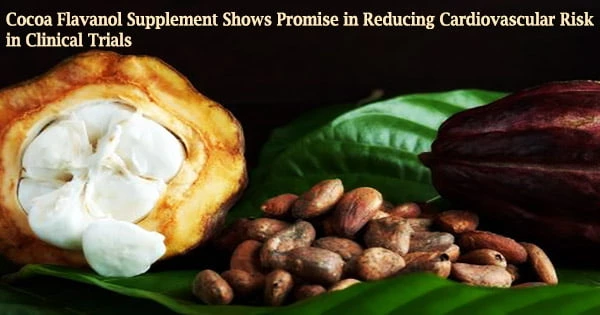The first large-scale research to examine the long-term effects of a cocoa flavanol supplement on cardiovascular disease prevention has found promising evidence that cocoa flavanols may have cardiovascular protective properties.
In papers published in The American Journal of Clinical Nutrition, a team led by Howard Sesso, ScD, MPH, and JoAnn Manson, MD, DrPH, both of the Division of Preventive Medicine at Brigham and Women’s Hospital, unpacks the main outcomes of the COcoa Supplement and Multivitamin Outcomes Study (COSMOS), a randomized, placebo-controlled trial that tested a cocoa flavanol supplement and a multivitamin in the prevention of cardiovascular disease and cancer.
While neither supplement reduced overall cardiovascular events, participants who were given the cocoa flavanol supplement had a 27 percent lower rate of cardiovascular death, which was a pre-specified secondary endpoint.
“When we look at the totality of evidence for both the primary and secondary cardiovascular endpoints in COSMOS, we see promising signals that a cocoa flavanol supplement may reduce important cardiovascular events, including death from cardiovascular disease,” said Sesso. “These findings merit further investigation to better understand the effects of cocoa flavanols on cardiovascular health.”
“Previous studies have suggested health benefits of flavanols compounds in several plant-based foods including cocoa, tea, grapes, and berries,” said Manson. “COSMOS was not a chocolate trial rather, it’s a rigorous trial of a cocoa extract supplement that contains levels of cocoa flavanols that a person could never realistically consume from chocolate without adding excessive calories, fat, and sugar to their diet.”
COSMOS was not a chocolate trial rather, it’s a rigorous trial of a cocoa extract supplement that contains levels of cocoa flavanols that a person could never realistically consume from chocolate without adding excessive calories, fat, and sugar to their diet.
JoAnn Manson
Cocoa flavanols have been proven to have cardiovascular advantages on blood pressure and blood vessel dilatation in smaller, short-term experiments. COSMOS was the first opportunity to see if a cocoa flavanol supplement may reduce clinical cardiovascular events in the long run. Researchers also looked at reductions in cancer risk.
In addition, the trial aimed to see if a common multivitamin could help prevent cancer and heart disease.
A composite of total cardiovascular events, including heart attacks, strokes, coronary revascularization, cardiovascular death, carotid artery disease, peripheral artery surgery, and unstable angina, was the primary cardiovascular outcome for the cocoa flavanol intervention.
Over 21,000 people were randomly assigned to consume 500 mg cocoa flavanols daily capsules (donated by Mars Edge), a multivitamin pill (donated by GSK Consumer Healthcare), neither, or both.
Cocoa flavanols were found to reduce overall cardiovascular events by 10% in the trial, but this was not statistically significant. Several secondary analyses found more evidence possibly to benefit cocoa flavanols on cardiovascular events.
First, individuals who took the cocoa flavanol supplement had a 27% lower risk of dying from cardiovascular disease.
Second, the study team noticed a stronger 15 percent drop in total cardiovascular events and a 39 percent reduction in death from cardiovascular disease when they took adherence to study tablets into consideration (by looking at individuals who took their study pills on a regular basis).
Third, despite not being a study focus, a composite endpoint of serious cardiovascular events (heart attacks, strokes, and cardiovascular deaths) was significantly reduced.
The authors point out in their article that their promising findings on cocoa flavanols and cardiovascular events should be interpreted with caution and that more research is needed.
A daily multivitamin had no influence on the total number of cardiovascular events or the number of individual cardiovascular events. Neither cocoa flavanols nor a multivitamin were found to be unsafe. COSMOS came to an end after 3.6 years, which was likely too short to determine whether the supplements had an impact on cancer risk.
A daily multivitamin enhanced the levels of various nutritional biomarkers, but it had no effect on total invasive cancer, which was the primary endpoint of the multivitamin studies. Flavanols from cocoa also showed no influence on overall invasive cancer.
Continued monitoring of COSMOS participants, according to the authors, may assist to clarify any long-term impacts on cancer and death. COSMOS is also being used by the researchers and colleagues to look at cognitive decline, falls, eye illness, and other aging-related outcomes that could be altered by the supplements.
“Although our study suggests intriguing signals for cardiovascular protection with cocoa flavanols, any health benefits due to taking these supplements will need confirmation in a future trial,” said Manson.
Adds Sesso: “Our message for consumers is to eat a healthy, balanced diet, rich in natural food sources of flavanols, and to stay tuned as we further evaluate other important health outcomes in COSMOS.”
During the course of the study, Sesso and Manson received investigator-initiated grants from Mars Edge, a division of Mars Incorporated dedicated to nutrition research and products, for infrastructure support and donation of COSMOS study pills and packaging, as well as Pfizer Consumer Healthcare (now part of GSK Consumer Healthcare) for the donation of COSMOS study pills and packaging.
During the course of the study, Dr. Sesso also received investigator-initiated funding from Pure Encapsulations and Pfizer Inc., as well as honoraria and/or travel for lectures from the Council for Responsible Nutrition, BASF, NIH, and the American Society of Nutrition.





